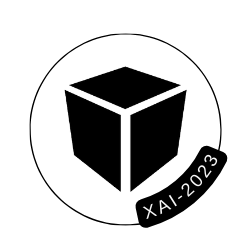1st International Conference on eXplainable Artificial Intelligence (xAI 2023)

Call for Workshops and special tracks
(26/28 July 2023, Lisbon, Portugal)
The organisers are pleased to invite proposals for workshops and special tracks to be held in conjunction with the conference. These provide a venue to discuss and explore emerging areas of eXplainable Artificial Intelligence research with scholars and practitioners from industry and academia.
We encourage both researchers and industry practitioners to submit workshop proposals. We strongly suggest involving organizers from different institutions, bringing different perspectives to the workshop topic. We welcome workshops with a creative structure that may attract various types of contributions and may ensure rich interactions.
Researchers interested in submitting a workshop proposal or a special track, are invited to contact us in advance, by the deadlines, so we can help to design successful proposals. In particular, for workshop proposals with novel interactive formats, we are happy to assist in further developing and implementing the ideas and check with the conference organizers their feasibility.
The submission of an article to a workshop or an accepted special track follows the same procedure as the articles submitted to the conference. Similarly, it follows the same review process and publication procedure, as detailed below.
Submitted manuscripts must be novel and not substantially duplicate existing work. Manuscripts must be written using Springer’s Lecture Notes in Computer Science (LNCS) in the format provided here. Latex and word files are admitted: however, the former is preferred (word template, latex template, latex in overleaf). All submissions and reviews will be handled electronically. The conference has a no dual submission policy, so submitted manuscripts should not be currently under review at another publication venue.
| Articles must be submitted using the easy-chair platform here. |  |
The contact author must provide the following information: paper title, all author names, affiliations, postal address, e-mail address, and at least three keywords.
The conference will not require a strict page number, as we believe authors have different writing styles and would like to produce scientific material differently. However, the following types of articles are admitted:
| full articles | between 12 and 24 pages (including references) |
| short articles | between 8 and 12 pages (including references) |
| extended abstracts | between 4 and 8 pages (including references) |
 | Full articles should report on original and substantial contributions of lasting value, and the work should concern the theory and/or practice of Explainable Artificial Intelligence (xAI). Moreover, manuscripts showcasing the innovative use of xAI methods, techniques, and approaches and exploring the benefits and challenges of applying xAI-based technology in real-life applications and contexts are welcome. Evaluations of proposed solutions and applications should be commensurate with the claims made in the article. Full articles should reflect more complex innovations or studies and have a more thorough discussion of related work. Research procedures and technical methods should be presented sufficiently to ensure scrutiny and reproducibility. We recognise that user data may be proprietary or confidential, therefore we encourage sharing (anonymized, cleaned) data sets, data collection procedures, and code. Results and findings should be communicated clearly, and implications of the contributions for xAI as a field and beyond should be explicitly discussed. |
 | Shorter articles should generally report on advances that can be described, set into context, and evaluated concisely. These articles are not ‘work-in-progress’ reports but complete studies focused on smaller but complete research work, simple to describe. For these articles, the discussion of related work and contextualisation in the wider body of knowledge can be smaller than that of full articles. |
 | Extended abstracts should contain the definition of a problem and the presentation of a solution, comparisons to related work, and other details expected in a research manuscript but not in an abstract. They are not simply long abstracts or ‘work-in-progress’. An extended abstract is a research article whose ideas and significance can be understood in less than an hour. Producing an extended abstract can be more demanding than producing a full or short research article. Some things that can be omitted from an extended abstract, such as future work, details of proofs or implementation that should seem plausible to reviewers, and ramifications not relevant to the key ideas of the abstract. It should also contain enough bibliographic references to follow the main argument of the proposed research. |
Special track articles
The article submitted to the special tracks follows the normal procedure and must be submitted via easy-chair, as mentioned above. The types of articles admitted are full articles, shorter articles and extended abstracts, as described above. The author of an article for a special track must select the name of such special track in the list of topics in easy-chair, along with other relevant topics.
Ethical & Human Subjects Considerations
The conference organisers expect authors to discuss the ethical considerations and the impact of the presented work and/or its intended application, where appropriate. Additionally, all authors must comply with ethical standards and regulatory guidelines associated with human subjects research, including using personally identifiable data and research involving human participants. Manuscripts reporting on human subjects research must include a statement identifying any regulatory review the research is subject to (and identifying the form of approval provided) or explaining the lack of required review.
Further style instructions
We ask the authors to start the reference section on a new page. Appendices count toward the page limit. Use an even number of pages (4,6,8..,22, 24)
The Peer-Review process
All articles submitted within the deadlines and per the guidelines will be subjected to a single-blind review. Papers that are out of scope, incomplete, or lack sufficient evidence to support the basic claims may be rejected without full review. Furthermore, reviewers will be asked to comment on whether the length is appropriate for the contribution. Each of the submitted articles will be reviewed by at least three members of the Scientific Committee.
After completion of the review process, the authors will be informed about the acceptance or rejection of the submitted work. The reviewers’ comments will be available to the authors in both cases. In case of acceptance, authors must meet the recommendations for improvement and prepare and submit the definitive version of the work up to the camera-ready paper submission deadline. In case of failure to consider the recommendations made by the reviewers, the organizing committee and the editors reserve the right not to include these works in the conference proceedings.
The article’s final version must follow the appropriate style guide and contain the authors’ data (names, institutions and emails) and the ORCID details. Submitted articles will be evaluated according to their originality, technical soundness, significance of findings, contribution to knowledge, and clarity of exposition and organisation.
According to the quality of the accepted article and its rank among all the other accepted manuscripts, it can be accepted for a full or short presentation or as a poster.
Code of Ethics
Inspired by the code of ethics put forward by the Association of Computing Machinery, the programme committee, supervised by the general conference chairs and organisers, have the right to desk-reject manuscripts that perpetuate harmful stereotypes, employ unethical research practices, or uncritically present outcomes or implications that disadvantage minoritized communities. Further, reviewers of the scientific committee will be explicitly asked to consider whether the research was conducted in compliance with professional, ethical standards and applicable regulatory guidelines. Failure to do so could lead to a desk-rejection
Proceedings publication
Each accepted and presented full, short and extended abstract manuscript, either as an oral presentation or as a poster, will be included in the conference proceedings by Springer in Communications in Computer and Information Science, edited by the general chair. At least one author must register for the conference by the early registration deadline. The official publication date is when the publisher makes the proceedings available online. This date will be after the conference and can take a number of weeks. If authors would like to publish their article open access (upon a fees with Springer), please refer to this page.
 |  |
Indexing
 |  |  |
 |  |  |
 |  |  |

